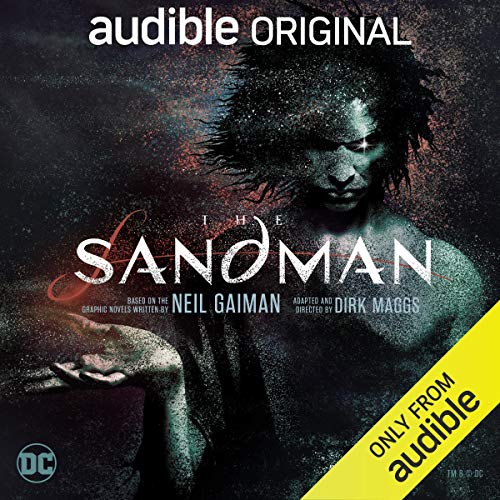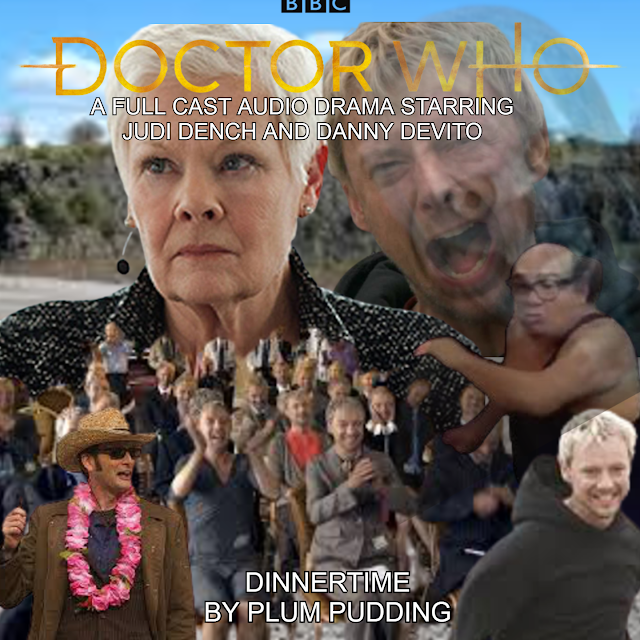The Sandman (Audible Adaptation) Act I
The Sandman Act I
The Sandman on audio is a bit of an oddity, because I got the sense at various times that it was more of a companion to the comic series than it's own fully forged entity in it's own right. The series is slightly slavish to the original script of the comic, the 11 hour audio experience covering the first twenty out of seventy five issues. The fascinating part is that this can sometimes result in some of the most gorgeous audio drama that I've ever reviewed on this website, simply because the source material is so strong (after all, The Sandman was always a comic that was quite "word-y,") And yet sometimes can result in surprisingly lacking episodes that fail to capture the original issues. The Sandman on audio is an example of the variability of adaptation, and I think that's one of the most interesting things - so little is being done to adapt these stories from the visual medium into the verbal.
The Sandman, large percentages of the story being an anthology series, of course, means that there's always a sense of variability within as to what it is trying to accomplish. I don't think that I'm going to bother critiquing the writing. It's Neil Gaiman, and in earnest, smarter minds than me have written very nice essays on the quality of the original series. I'm viewing this exercise solely as that of what this series is, an adaptation.
As an adaptation, it's a little odd, because the only way the story tends to have been changed for the audio medium is to add narration at times. As with many of the other audiobooks from the prose of Gaiman, he himself takes up the reins of the narrator. Occasionally a line from a character will be added to clarify things, but it's mainly the narration. The problem with the narration tends to be how little and slapdash it tends to be added in. You can tell what narration is in the original comic and what isn't. Neil Gaiman's prose is delicious, ethereal, and matter of fact. There's something wonderfully horrific about this narration, whenever something truly awful happens, Neil Gaiman states it so calmly that it's a little more chilling. Whenever a story already has narration built in, it's a majestic addition. Neil is really good at actually acting during the narration, which indeed surprised me. However you can immediately tell whenever it's added in to describe something that was already apparent in the comic. The series has a preoccupation with Dream's clothes. There's almost always a description of Dream's clothes when he shows up, which is really, really odd, considering it's almost always "he wears black." But they will describe his trenchcoat, or his robes, or his seventeenth century get-up, or however the story entails - and then say he doesn't have eyes, only dark holes with stars in them. This gets very repetitive. We know.
The lack of description for the environments - or sometimes important characters, lead to scenes that I would not understand if I were not already familiar with the comic or occasionally looking at the comic alongside the audio play (a magnificent experience.) There's a particular moment in the comic that's a little famous for how brutal and painful it is to the audience, where while a boy is dreaming about a castle in the clouds, he is awoken from his dream by a Rat biting his finger to the harsh reality that he lives in a cold dark basement. This is hardly narrated at all. The actor for the boy, Jed, simply goes immediately from "wow I love my castle in the clouds" to screaming because a rat bit his finger. Scenes like this are made for a visual medium and little is done to translate them, leading to a loss of a few dramatic moments. Songs included in the comic via their words, such as in Dream a Little Dream of Me, are excluded. This is probably for legal issues, but it's disappointing as hell.
On the whole, I much preferred The Sandman's more episodic issue adaptations to that of the main storyline. They usually have much more omnipresent narration, and tell their stories exceedingly effectively. The best episodes from Act I are Calliope, Dream of a Thousand Cats, 24 Hours, Sleep of the Just, Sound of Her Wings and my two particular favorites - not in the original comic, but definitely here, Tales in the Sand and Façade, both of which are actually improved by the audio medium.
The ensemble cast of the series is exceptionally large and for the most part, exceedingly well acted. I'll try to mention all of the important players, but this may take a while. I'll try to avoid discussing characters that were well cast and that I had no problems with, as the series' cast is so mammoth. This means that I'll have to briefly gloss over James McAvoy - which hurts, to be fair, as he is excellent - as well as Michael Sheen as Lucifer, Bebe Neuworth as The Siamese Cat, Justin Vivian Bond as Desire, Miriam Margolyes as Despair, Samantha Beart as Calliope, Arthur Darvill as Shakespeare, Taron Egerton as Constantine, Andy Serkis as Matthew and ESPECIALLY Samantha Morton as Urania Blackwell. They're all damn good, and thus I have little to say about them as a result, they're all just really great. This may sound like a large portion of the cast. Well, it sort of is, but you can't imagine how large this cast is. It's very enormous.
It feels apropos to begin with Cain and Abel. Cain and Abel are both very well played, and the nature of their constant loop is played in a much more horrific nature than that of the television series. I really appreciated that - the moment in episode two where Cain kills Abel is somehow one of the scariest moments in the series in a way it never was on the page or on television. However, the nature of the audio medium means that the same actor who plays Abel later plays serial killer Funland - he makes very little effort to alter his performance, which took me out of the production - this is especially egregious because Funland is so scary and a highlight in all of the other versions.
Kat Dennings is a unique incarnation of Death who, similarly to the character, wasn't as I expected - she has an excellently soft and kind nature, and excels in scenes where she gets to show her caring nature. The Sound of Her Wings and Façade are both very strong episodes because of this. However whenever the script asks of her to be otherworldly or deliver exposition, she tends to struggle immensely. I ultimately wasn't sure how to feel about her.
The series has a bit of a villain problem. While 24 Hours and Sound of Fury have a chillingly gorgeous adaptation, mostly thanks to the excellent ensemble, I wasn't as convinced by William Hope's more maniacal maniac as I was by the television version's terrifying David Thewlis. He's fine! He just - David Thewlis! David Thewlis is really, really, really, really, really, really, really good, and being fine in comparison is exceedingly disappointing. Riz Ahmed is my least favorite performer in the production - the audio genre simply does not work for the most visual character in the series, and arguably the main villain of Act I, The Corinthian. His voice doesn't manage to intimidate enough to offset the loss of the horrific imagery, and the moment where The Corinthian loses his glasses, instead of being the scariest moment yet, is made a little ridiculous by the choice to give Riz Ahmed helium or something. This is something that could have been fixed by the narration going into deeper description of how horrific the Corinthian actually appears.
The Rose Walker arc seems to be the arc that got the least focus when adapting the series for audio. This is an arc with incredible stuff, like the phenomenal issue Into the Night, which is one of my favorite issues in the original comic. It's sort of not done as well on audio. There's a lot of cracks that begin to show around this area that weren't there in the original series. The series begins, has a middle and an end that are all a high note, but The Doll's House arc just doesn't really work very well when translated to voice exclusively. The Doll's House as an arc is the most strikingly visual out of the series, and not all of it, especially related to the Jed stuff, really works as an audio production. The (presumably) child actor they've cast as Jed is really really good for a child actor in an audio production, but the script is a lot less clear what is dream and what is reality, especially when it ducks in and out of between it so frequently. This can become frustrating and very confusing for someone not intimately familiar with the original comic - the visuals of the dreaming being contrasted with the stark basements and Collector's convention and all of this hellish imagery is sort of the point of the arc to me, which makes it a little silly that it's not really utilized all that well. If you're going to add narration to inform me that Dream is wearing black, you should add more detailed information about the environments the characters are standing in. Luckily the story finishes off pretty well with Lost Hearts, and the majority of the really cool anthology stuff is at the end of the set, so you do leave on an immensely high note.
Nonetheless, while the adaptation can be flawed, I'd still recommend it to any Sandman fans or audiophiles. While perhaps you'd be better off reading some of the comics or the television series first, this is still a really gorgeous production that puts most others of it's kind to shame. Despite being slavish to the comic, it's still it's own beast in the way that it's horror influences are driven to the forefront - as benefits the genre it takes place in. Audio Drama is the perfect medium for horror, after all! I'm very excited for act II, III and IV. This is pretty great stuff.
Now for the Episodes Scoring, On A Scale of 1 to 5 Based on How Well They Adapt The Original Tale, not based on the quality of the original tale. A 6 out of 5 will demonstrate that it exceeds the original. This will not happen often, but those rarities deserve special credit.
1. Sleep of the Just - 5/5, Excellent Adaptation
2. Imperfect Hosts - 3/5, Decent Adaptation
3. Dream a Little Dream of Me - 3/5, Decent Adaptation
4. A Hope in Hell - 4/5, Quality Adaptation
5. Passengers - 2/5, Iffy Adaptation
6. 24 Hours - 5/5, Excellent Adaptation
7. Sound And Fury - 5/5 Excellent Adaptation
8. The Sound of Her Wings - 3/5 Decent Adaptation
9. Tales in the Sand - 6/5 Perfect Adaptation
10. Men of Good Fortune - 3/5 Decent Adaptation
11. The Doll's House - 3/5 Decent Adaptation
12. Moving In - 2/5 Iffy Adaptation
13. Playing House - 2/5 Iffy Adaptation
14. Collectors - 4/5 Quality Adaptation
15. Into the Night - 2/5 Iffy Adaptation
16. Lost Hearts - 4/5 Quality Adaptation
17. Calliope - 5/5 Quality Adaptation
18. Dream of a Thousand Cats - 5/5 Quality Adaptation
19. Façade - 6/5 Perfect Adaptation
20. A Midsummer's Night Dream - 3/5 Decent Adaptation




Comments
Post a Comment